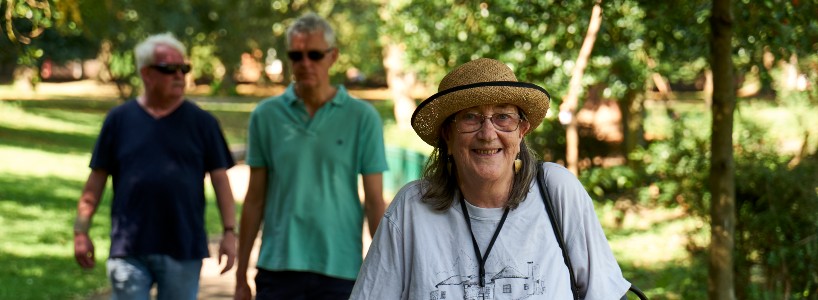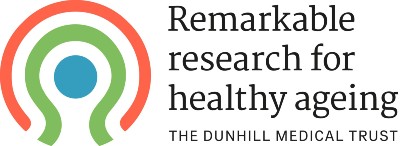The Dunhill Medical Trust PhD Opportunity
Newcastle University invites applications to a doctoral training programme on multiple long-term conditions and social inequalities funded by The Dunhill Medical Trust.
This PhD programme focuses on multiple long-term conditions (MLTCs) and social inequalities. The projects build on our Newcastle University-led James Lind Alliance Priority Setting Partnership on MLTCs in later life that highlighted unanswered questions in this area. The majority of the studentships align with our NIHR Infrastructure, including The Biomedical Research Centre, Policy Research Unit Older People and Frailty, NIHR Innovation Observatory, Applied Research Collaboration North East and North Cumbria, and the NIHR School for Public Health Research. Three studentships in this programme have already been filled and commenced in October 2022. The remaining advertised studentship is expected to start in January 2023.
One doctoral studentship is available from the projects listed below under themes 1, 3 and 4. Applicants are invited to indicate their preferred PhD projects, but also to nominate a second and third choice.
Theme 1: Understanding the mechanisms of ageing and age-related disease

Project 1: Epigenetic alterations in cellular ageing
Supervisor: Dr Louise Reynard
Epigenetic alterations are a primary hallmark of cellular ageing, with many common age-related diseases such as cancer, diabetes and osteoarthritis characterised by abnormal epigenetic signatures. This project aims to understand the role of DNA methylation, an epigenetic regulator of gene expression, in musculoskeletal ageing and multi-morbidity. CRISPR-Cas9 genomic and epigenomic editing of cartilage and bone cells will be used to determine the effect of DNA methylation on ELOVL2 and FHL2 gene expression and investigate the function of these genes in cellular ageing. This project offers an opportunity for a student to work at the forefront of ageing research.
Project 2: Developing novel methods to characterise clusters of MLTCs and their antecedents
Supervisors: Professor Miles Witham and colleagues
MLTCs in older people appear to cluster more than would be expected by chance. Understanding how different conditions associate is important to understand underlying risk factors and mechanisms for groups of conditions. Working with the ADMISSION collaborative, this studentship will apply advanced statistical techniques to large cohorts (e.g. UK BioBank) and electronic hospital datasets, to characterise how groups of conditions associate and change over time. A range of novel clustering methods will be developed and implemented, including directed clustering of risk factors, mechanisms, and outcomes.
Theme 2: Tackling social determinants of healthy life expectancy
Studentships filled for this theme

Theme 3: Improving the quality of life for older people

Project 1: End of life and palliative care for people with multiple long-term conditions
Supervisors: Dr Felicity Dewhurst and colleagues
End-of-life and palliative care for older people with multiple long-term conditions requires development to address unmet and poorly served patient needs. Identifying the target patient group and appropriate point of referral/intervention are key challenges. This study will used mixed methods to further our understanding of the palliative care needs of older people with multiple long-term conditions, and how services should respond. This doctoral project will provide an opportunity to develop skills in qualitative and quantitative methods, and contribute to policy and practice in a growing area.
Project 2: Assessing mobility in the real world: an inclusive post-diagnostic tool to support older adults across the spectrum of cognition and care
Supervisors: Dr Silvia Del Din, Dr Ríona Mc Ardle, Professors Lynn Rochester and Louise Robinson
Cognitive impairment is often accompanied by other long-term health conditions, and comes with increased risk of falls, frailty and placement in aged care. There is a global need for improved and proactive care of people with cognitive impairment to reduce these risks.
Assessing daily mobility (e.g. walking behaviours/abilities) with digital technology may capture subtle changes in the condition, and flag risk of unwanted events (e.g. poorer walking abilities reflect greater fall risk). To combat social inequalities in care, we must explore the ability of digital assessment of mobility to predict post-diagnostic outcomes in representative CI groups, inclusive of ethnic minorities, and people with lower socio-economic status or living in deprived/rural communities or within aged care.
The aim of this project is to develop novel ways to look at mobility with digital technology, and to understand its ability to predict unwanted events in an inclusive group of people with cognitive impairment. This project will utilise data from studies which assessed mobility in people with cognitive impairment using wearable devices for a seven-day period in the real world. A multidisciplinary supervisory team (psychology, engineering, movement science, primary care) will support you to develop a foundation for a post-diagnostic tool to support care.
Theme 4: Preventing, delaying or reducing future health and social care requirements

Project 1: How can social care data be used to promote equitable outcomes in later life for people with multiple long-term conditions?
Supervisors: Professor Barbara Hanratty and colleagues
Ensuring that people with multiple long-term conditions access the health and social they need is critical. Yet not everyone gets the help they need to live well, and there are growing health inequalities between the richest and poorest. Currently, there is little evidence about how to ensure health and wellbeing outcomes are equitable for people with multiple long-term conditions.
This doctoral research offers an exciting opportunity to work closely with a local Integrated Care System to address this critical gap in evidence. Specifically, the work will explore how data from domiciliary social care providers can be used to promote equitable wellbeing and health outcomes for people with multiple long-term conditions. This novel research will suit candidates with an interest in developing metrics at the intersection of social care and health inequalities. Candidates will be embedded in an existing cross-university research team and supported to work closely with key stakeholders, to ensure their work has real world impact.
Project 2: Understanding and mapping trajectories of functional decline in older people
Supervisors: Dr Andrew Kingston and colleagues
Older people lose the ability to perform tasks that maintain independence (such as bathing and eating) in a predictable order. Yet, this ordered loss of capability with daily activities is seldom used to develop understanding of care needs at individual or population level. Using longitudinal studies of ageing, and the property of loss in daily activities, this project will help us to detect and track functional decline through daily activities; expose inequalities and provide insights into how to support older people to live independently for longer. This project will provide an opportunity to work with leaders in the field, to develop skills in epidemiological analyses, and address some of the most important questions in ageing research.
Project 3: Digital technologies to displace and reduce future needs for health and social care: An ethnographic study of community interventions
Supervisors: Dr Jenny Liddle and colleagues
Inequalities in health and social connections in later life can result from cumulative advantage or disadvantage in circumstances and experiences over the life course. Chronological age can also be a barrier to treatment for physical and mental health conditions, and access to health care differs for people living in disadvantaged versus affluent areas. The consequences of these inequalities can be compounded in later life by factors such as reduced income in retirement and the impact of multiple long-term conditions. The COVID-19 pandemic had a disproportionate impact on older people, reinforcing inequalities in later life. Physical distancing requirements exacerbated loneliness and isolation and led to delays in accessing health and care services. The pandemic also resulted in rapid digitalisation of services, potentially increasing inequalities further by disadvantaging those older people without the ability, skills, knowledge or resources to participate digitally within society (digital citizenship). This studentship will use ethnographic methods to critically explore the role of community groups in both promoting digital citizenship, and in using digital technologies to support wellbeing. The potential impact of such technology-related innovation will be investigated, focusing on how older people living with multiple long term conditions interact with and use health and social care resources.
Entry requirements
Entry: January 2023
A 2:1 honours degree, or international equivalent. Further research experience or a Master’s degree would be advantageous. International students may apply.
Further information about entry requirements.
How to apply
Please send a CV and covering letter (no more than 500 words) to dmtdtp@newcastle.ac.uk that contains your reasons for applying and how you are qualified. Please also list up to three projects in your letter, and number them in order of preference from 1 (top choice) to 3 (least preferred).
Deadline: Tuesday, 15th November 2022 at 17:00
Interviews expected to take place in the week commencing 21st November 2022.

Thank you to the Centre for Ageing Better for images used from their age-positive image library.
